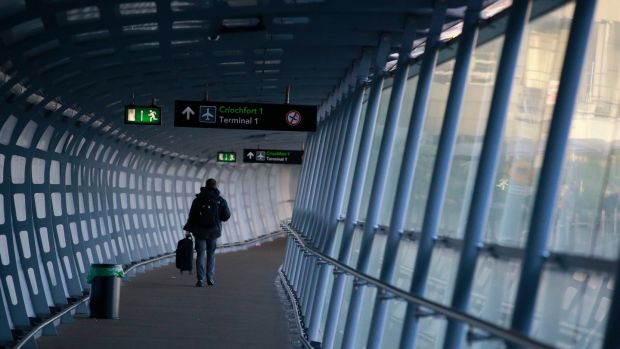For international students, the beginning of summer can mark the provisional end of a culturally life-changing year. After adjusting to the manner of living in Dublin, going back to one’s home country feels, paradoxically, foreign. We habituate ourselves not only in respect to the heightening of responsibility and independence required when living in a city, but also to the process of growth that is particularly necessary for living in another country.
We grow like flowers in spring, unable to do anything but acclimatize. Ireland, out of obligation and inclination, becomes our home. Dublin and Trinity, become our roots, from which we sprout and cultivate ourselves to become as naturally Irish as we can. Gradually, we pick up words like “sesh” and “lads” and “feck”, and phrases like “what’s the craic”, “it’ll be grand”, and “thanks a million”. Pints become sacred, tourists an endearing, wide-eyed nuisance, and banter an undying requisite to conversing. Without noticing, our intonations alter, our expectations change, and our outlooks shift. Out of the sheer adaptive compulsion to naturalize our new, unfamiliar way of life, we embrace these mannerisms as we would a fresh pair of hiking boots. Perhaps they’re not perfectly comfortable straight away, but with enough wear, they’ll fit like a glove.
And then, summer comes, and in what feels like a nanosecond, we’re home. Back to the supposedly “familiar.”
But “familiar” is a moving target, dependent more upon where you settle and find a sense of identity than where you’re from. College, Dublin, and self-reliance naturally alter your perception of who you are. The year changes you, and you are better for it. Dame St is central to existence, Costa to wakefulness, pints to sanity. This much becomes true. Familiar. Then, suddenly, after a seven-hour flight and a sleepy-sad reunion with mom and dad, everything is different.
It’s culture shock in reverse.
Adapting to a foreign culture means doing everything in your conscious and subconscious power to make it your own. In the first few weeks of life abroad, I was giddy over the multi-coloured euro bills, the coins that allow buying a coffee with an exponentially lighter wallet, the nonrestrictive and mostly trusting nature of the Gardaí, the ability to order myself a pint or a cocktail with dinner or at a bar, and to legitimately be able to enjoy a proper night out in the city without being perceived as a callow child by a number of US laws.
“Familiar” is a moving target, dependent more upon where you settle and find a sense of identity than where you’re from
In my American suburb, the police officers patrol residential streets for lack of much else to do. There is very little crime, so the priority lies in a perpetually heightened suspicion of the most dubious and unscrupulous community members – adolescents. We are the targets of mistrust, which is both aggravating and tiresome. When we are treated as untrustworthy and immature children, we act as such. We are resentful and unwilling to comply, because, as most of us know, being told what to do almost inevitably compels us to do the opposite. So, after nearly a year of self-reliant, autonomous life in Dublin, where I am permitted not only to drink legally, but to make my financial, medical, and social decisions on my own, coming back to my hometown in suburban Illinois was difficult. Shocking. Culturally disorienting.
In the first few weeks of life abroad, I was giddy over the multi-coloured euro bills, the nonrestrictive and mostly trusting nature of the Gardaí and the ability to order myself a pint or a cocktail with dinner or at a bar
At a hotel bar in Chicago with extended family during my grandmother’s birthday, myself being the only relative under the (legal drinking) age of 21, all twelve of us were pressed to leave the venue as long as I was unable to provide an ID proving my legality. On my grandmother’s birthday.
I would not have felt nearly as irritated or so pathetically juvenile had I not experienced a year of legality and near adulthood in Ireland prior. But for the remainder of the evening I felt guilty and angry for such a dismissal, for such a restrictive cultural practice that I had wholly forgotten was my own reality before I’d moved to Ireland.
At restaurants, I was startled to notice how promptly the waitstaff delivered the check, goading customers to leave as soon as the plates have been cleared, encouraging a rapid turnover of tables. Sometimes the immediacy is refreshing, other times, it’s just frustrating. I noticed how quickly I adapted to feeling impatient and restless when things did not move at such an expeditious pace, how infectious the momentum of life here becomes.
After such a revolutionary year of assimilating and adapting and lapping up every last lick of life in Dublin, home is not quite the place it used to be
In smaller ways, things are just different. I forgot how great air conditioning on a hot day feels, how much I missed driving (on the alternate side of the road, and never manual). Obviously, my move back to America is not nearly as culturally shocking of a transition as another international student might experience. I’m still fortunate to find myself in either location. Neither can be considered a regression from the other.
Nonetheless, after such a revolutionary year of assimilating and adapting and lapping up every last lick of life in Dublin, home is not quite the place it used to be. American culture does not seem more “mine” than the other now, and as I head back to Ireland for the next school year, I’ll continue to happily straddle the line between both, leaning ever toward the one that makes me feel most free.







